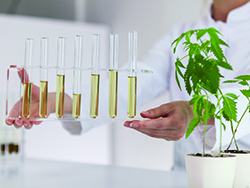 In the investment world, cannabis is the new big bet – and Guernsey’s and Jersey’s commitment to operating well-regulated environments makes them a safe space to invest in the plant
In the investment world, cannabis is the new big bet – and Guernsey’s and Jersey’s commitment to operating well-regulated environments makes them a safe space to invest in the plant
THE Channel Islands have long been famous for their Jersey Royal potatoes and Guernsey tomatoes, but today a new crop is soaking up the sunshine and promising to deliver the next horticultural boom.
New ventures on both Jersey and Guernsey are growing forms of hemp, or cannabis – a plant most readily associated with illicit marijuana, but which is now fuelling a predicted boom in demand for medicinal and health supplement products.
At Warwick Farm in St Helier, Jersey Hemp is preparing its third harvest, with hopes of surpassing last year’s bumper crop of 13,000 litres of hemp oil. And on Guernsey, at the former Douit Vinery, disused glasshouses behind security fencing have been repurposed by Celebrated to grow up to five million grammes of cannabis leaves this year, which will be pressed to produce CBD oil.
CBD, or cannabidiol, is an active ingredient in cannabis and may help to treat conditions such as pain, insomnia and anxiety.
A growing market
The emerging market for legal cannabis products, and its rapid potential for growth, is a phenomenon few could have predicted even five years ago.
Based on the assumption that medical and recreational cannabis will be fully legalised across Europe by 2023, research group Prohibition Partners predicts that the region will become the world’s biggest legal cannabis market in the next five years and be worth an estimated €123bn by 2028.
By comparison, it estimates that the recreational cannabis market in Europe was worth €30bn in 2018.
Not surprisingly, this growth is a prospect that has attracted the attention of investors as well as growers – and some of the Channel Islands’ most respectable professional firms are becoming involved.
But it’s also a sector that’s riddled with confusion and complexity. There are three main categories of cannabis product: recreational cannabis, used to obtain a ‘high’; medicinal cannabis, which is licensed as a drug to treat conditions such as epilepsy and control pain; and products containing CBD oil, which are sold as nutritional supplements, but for which specific health claims cannot be made.
Recreational cannabis remains illegal in most of the world, including the Channel Islands; medicinal cannabis is gradually gaining legal acceptance; and CBD – which contains only minute traces of the psychoactive ingredient THC (tetrahydrocannabinol) – is generally legal but within regulatory constraints.
Guernsey law firm Collas Crill has advised a number of clients, including family offices and individuals, on investing in legal cannabis enterprises internationally. One client, AIM-listed investment fund Fast Forward Innovations, has made two investments in medicinal cannabis companies.
Collas Crill Group Partner Wayne Atkinson says: “Our role is to ensure nothing is done that would fall foul of the Proceeds of Crime laws here in the Channel Islands. Potentially, there’s a risk you could invest in something that is legal at the location where it’s being used, but still poses you a problem here in terms of receiving monies from those investments.”
Richard Field, a Partner at Appleby in Guernsey, agrees, saying the requirement to establish that the product is legal in the Channel Islands, as well as at source, is more challenging than in some other jurisdictions. “From a market perspective, at the moment it’s in the ‘too difficult’ bracket for those looking at investment opportunities through the Channel Islands,” he says.
 Potential hurdles
Potential hurdles
Guernsey and Jersey have granted licences for cannabis to be grown for medicinal purposes, and Field says both governments are looking at further liberalisation that should make it easier to invest in the sector.
But investing in recreational cannabis remains seriously off-limits because it is illegal both in the Channel Islands and in many other jurisdictions. One problem, says Field, is that companies in jurisdictions where recreational cannabis is legal, such as Canada and some US states, are involved in both recreational and medicinal cannabis.
“Obviously with those kinds of businesses, differentiating between the income streams for recreational and medicinal may be impossible,” he explains.
The Proceeds of Crime issue would be crystallised when you seek to take a return from the investment, and for many that’s still a risk too far, adds Field.
Even for investments that are deemed legal, banking is a serious hurdle. Rupert Pleasant, Director at professional services firm Beauvoir Group, has been acting for a client who wants to set up an enterprise growing cannabis in southern Africa for the medicinal market, which would be exported to Europe.
“We’ve set up the master company in Guernsey, but the difficulty comes from finding banking facilities,” he says. “We’ve been to 20 banks in the Channel Islands, Isle of Man, Malta, Switzerland and Mauritius, and none of them want to touch it, even though it will be a wholly legal enterprise.”
The equation is more straightforward for lawyers, says Atkinson at Collas Crill. “We are typically advising clients on whether an investment in something is legal. For banks, it’s different because they have an ongoing relationship sending money back and forth around the world, with each transaction potentially raising its own issues.”
However, this is an opportunity that can’t be ignored, he believes. Companies such as Coca-Cola, AB InBev (owner of Budweiser) and Marlboro parent Altria are all dipping their toe into cannabis-related products. “It is huge,” says Atkinson. “This is not some tie-dyed hippies in a shed somewhere. This is serious business now.”
Safest option
CBD products marketed as nutritional supplements are legally the most straightforward segment of the cannabis sector to get involved in. Guernsey-based Healthspan, which markets vitamins and other supplements, started selling capsules of CBD oil in March 2018 and has since expanded into drops.
The products are listed in Boots and Superdrug stores, and Rollo de Sausmarez, the firm’s Director of New Product Marketing and Development, says: “This has grown to be a really big part of our business; it’s the fastest growing area that we’ve ever had.”
Healthspan’s CBD products are manufactured to the company’s own specification in Europe from European Union-listed varieties of industrial hemp, although de Sausmarez says he would like to source it from the Channel Islands if the right quality product became available.
The ‘big bucks’ will probably be in medicinal cannabis, he believes, partly because, in the case of supplements, specific health claims cannot be made.
Nevertheless, CBD supplements are benefiting from huge word-of-mouth endorsement. A recent study of CBD users, cited in the journal Cannabis and Cannabinoid Research, showed that they typically take the supplements to help with joint pain, chronic pain, sleep disorders, mood and anxiousness and stress.
Healthspan’s customers are largely aged over 65, but when the company asked them if they would be happy for it to offer CBD products, only one out of 300 was against it. “I was surprised,” says de Sausmarez.
The low level of regulation, however, means that CBD is a market segment that already has a mixed reputation, with some studies showing that many products on the market contain little or no cannabis oil. “We test every batch and publish the results on our website,” says de Sausmarez.
This transparency offers a clue to where the Channel Islands could have a serious advantage in the overall cannabis sector.
For anyone looking to set up a corporate entity or an investment fund investing in the sector, the islands’ expertise in dealing with regulation and strong imperative to stay on the right side of the law could prove a significant advantage.
Regulatory advantage
Atkinson says: “In all of the offshore jurisdictions, we are looking to comply with international obligations around issues such as money laundering and terrorist financing. Here in Guernsey, because we have such a strong financial services industry, there is a lot of expertise around these obligations in a properly regulated space. People are very alive to these issues and to doing things properly.”
Appleby’s Field agrees. “This is one of those jurisdictions where you have that badge of respectability and validity and where there are proper checks.
"So, to the extent that you’re saying: ‘We want to invest in or run a CBD business and we want it to be open and transparent and we want people to know that we’re doing the right thing, and this is not seen as some kind of shady drug-running operation’, this would be a good place to do it.”
For Beauvoir Group’s Pleasant, it’s an opportunity that can’t be ignored. “The Channel Islands need to diversify and develop new markets. We have always been progressive and looked at providing solutions, and if you put together the fact that Guernsey has already granted licences for growing cannabis with the fact that we are a world-class financial centre, it becomes a natural jurisdiction for somebody wanting to put an entity in place.”